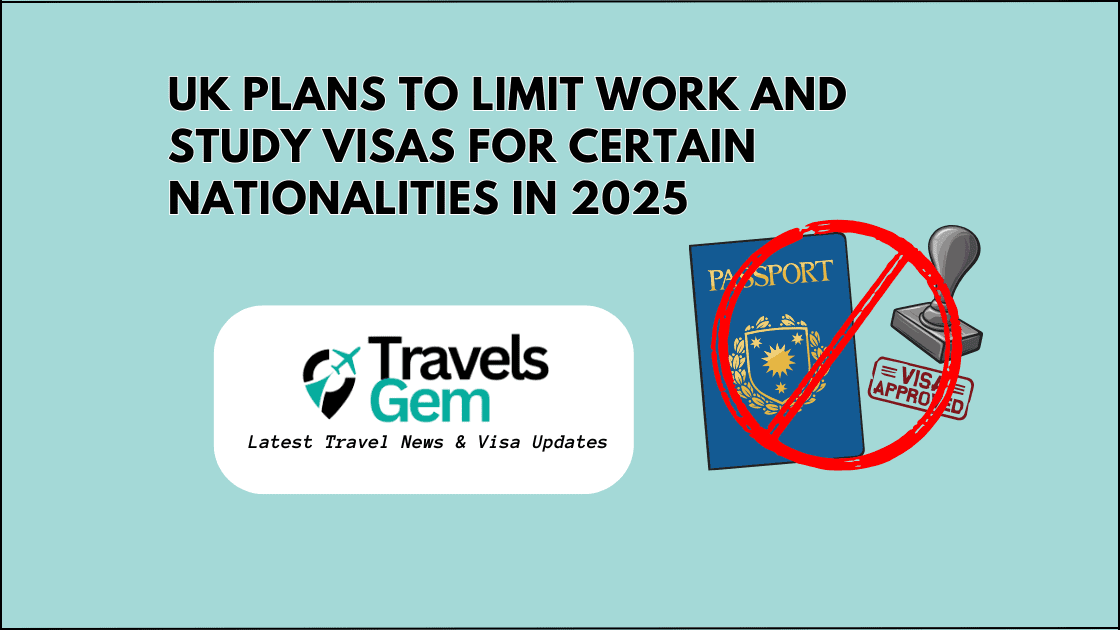The UK may restrict work and study visas for select nationalities in 2025, according to new government plans. This change could make it harder for people from countries like Pakistan, Nigeria, and Sri Lanka to come to the UK for jobs or education. The UK Home Office wants to reduce immigration by targeting people who overstay their visas or claim asylum after arriving legally. This article explains why the UK may restrict work and study visas for select nationalities in 2025, which countries are affected, what it means for applicants, and how to prepare. Written in simple English, it uses the latest information up to May 6, 2025, to help students, workers, and families plan their future.
Why the UK May Restrict Work and Study Visas
The UK government says the immigration system is “broken” and needs fixing. They believe some people come to the UK on work or study visas but stay longer than allowed or apply for asylum to live permanently. To stop this, the Home Office plans to limit visas for nationalities most likely to do this. A Home Office spokesperson said, “We are building intelligence to identify these individuals earlier and faster. We will take action if we see trends that break our rules.”
The Labour government, which won power in 2024, promised to lower immigration numbers. This follows a 37% drop in visa applications from 1.24 million to 772,200 between April 2024 and March 2025, caused by stricter rules like higher salary requirements (£38,700 for skilled workers) and bans on bringing family members. Despite this, the government wants more control, especially after 108,000 asylum claims in 2024, with 10,542 from Pakistan, 2,862 from Sri Lanka, and 2,841 from Nigeria.
The UK may restrict work and study visas for select nationalities in 2025 to reduce “net migration” (the number of people arriving minus those leaving). These changes will be detailed in an Immigration White Paper expected in May 2025.
Which Nationalities Are Affected?
The UK may restrict work and study visas for select nationalities in 2025, with Pakistan, Nigeria, and Sri Lanka named as likely targets. These countries have high numbers of visa overstays or asylum claims. For example:
- Pakistan: 10,542 nationals claimed asylum in 2024, the highest of any country.
- Nigeria: 2,841 asylum claims, plus many student and worker applications.
- Sri Lanka: 2,862 asylum claims, with growing visa applications.
Other countries could also be added, but no final list has been confirmed. The Home Office stopped sharing exit check data in 2020, so it’s unclear exactly which nationalities overstay most. X posts on May 6, 2025, confirm public concern, with users like @Richmon1992 noting restrictions for Pakistan, Nigeria, and Sri Lanka.
How Will the Restrictions Work?
The UK may restrict work and study visas for select nationalities in 2025 by:
- Rejecting Applications: People from targeted countries who fit the “profile” of someone likely to claim asylum may be denied visas. This profile could include age, job type, or financial status.
- Checking Bank Statements: The Home Office will review bank accounts submitted with visa applications to spot people who might rely on public funds, like free housing.
- Adding Extra Steps: Applicants may face longer wait times, more background checks, or stricter proof of intent to return home after their visa ends.
- Requiring eVisas or ETA: From April 2025, all travelers (except British and Irish citizens) need an Electronic Travel Authorisation (ETA) or eVisa, costing £16, to enter the UK. This applies even for short visits and adds scrutiny for targeted nationalities.
These rules aim to stop people from using work or study visas as a way to stay in the UK permanently. However, Enver Solomon from the Refugee Council said some people apply for asylum because their home country becomes unsafe during their stay. He believes they should get a fair chance to explain their case.
Impact on Students, Workers, and Businesses
The UK’s plan to restrict work and study visas for select nationalities in 2025 will affect many groups:
- Students: Students from Pakistan, Nigeria, and Sri Lanka may need to show stronger proof they plan to study and leave after their course. This could reduce applications, as seen with an 11% drop in study visas in 2024. Universities, already facing money problems, worry about losing international students who pay high fees. For example, Cardiff University plans to cut 10% of its staff due to budget issues.
- Workers: People applying for jobs, like skilled workers or health and care workers, may face delays or rejections. The £38,700 salary rule already cut health and care worker visas by 81% in 2024. Industries like healthcare and tech may struggle to find workers.
- Businesses: UK companies that hire international talent could lose skilled workers, hurting the economy. X posts from @SachaWoolLegal highlight concerns from businesses about visa restrictions.
- Families: Fewer workers and students can bring family members, as 2024 rules banned dependants for most students and care workers. This led to an 85% drop in student dependant visas.
Despite a 4.6% rise in study visas (411,100 by January 2025), the restrictions could reverse this growth, especially for price-sensitive countries like Pakistan and Nigeria.
Tips for Applicants Facing Restrictions
If the UK may restrict work and study visas for select nationalities in 2025, here’s how to improve your chances:
- Apply Early: Submit your application 3–6 months before your course or job starts. Visa processing can take longer with extra checks. Visit gov.uk for forms and fees (£490 for student visas, £298–£1,274 for work visas).
- Show Strong Proof: Include clear documents, like:
- Prove You’ll Leave: Show ties to your home country, like a job, family, or property, to prove you’ll return after your visa ends.
- Get an eVisa or ETA: Register for a UKVI account and get an eVisa by December 31, 2024, as Biometric Residence Permits (BRPs) won’t work in 2025. Apply for an ETA (£16) if visiting or transiting.
- Hire a Lawyer: An immigration lawyer can check your application and fix mistakes. Find one at immigrationbarrister.co.uk.
- Explore Other Countries: If UK visas are hard to get, consider Canada, Australia, or Germany, which have lower financial requirements for students and workers.
- Stay Updated: Check gov.uk or follow X posts from trusted sources like @TheLawMap for news on the Immigration White Paper.
Challenges and Concerns
The UK’s plan to restrict work and study visas for select nationalities in 2025 raises issues:
- Unfair Targeting: Critics say focusing on Pakistan, Nigeria, and Sri Lanka is unfair, as political changes in these countries may force people to seek asylum.
- Economic Harm: Universities and businesses may lose talent, worsening financial problems. In 2025, 72% of UK universities expect budget deficits.
- Lack of Data: The Home Office hasn’t shared overstay statistics since 2020, making it hard to know if the targeted nationalities are the main issue.
- Housing Pressure: Fewer international students could ease housing shortages in cities like London, but it won’t solve the 450,000 student bed shortfall by late 2025.
What’s Next?
The UK may restrict work and study visas for select nationalities in 2025 as part of a bigger plan to lower immigration. The Immigration White Paper, due in May 2025, will give full details. Until then, visa applications face stricter checks, and all travelers need an ETA or eVisa by April 2025. Despite a recent rise in study visas, the new rules could reduce applications from countries like Pakistan, Nigeria, and Sri Lanka. Keep checking gov.uk for updates, as rules may change fast.
Conclusion
The UK may restrict work and study visas for select nationalities in 2025 to cut immigration and stop visa overstays. Pakistan, Nigeria, and Sri Lanka are likely targets due to high asylum claims. This could make it harder for students and workers to come to the UK, hurting universities and businesses. To avoid problems, apply early, show strong proof, get an eVisa, and consider other countries if





